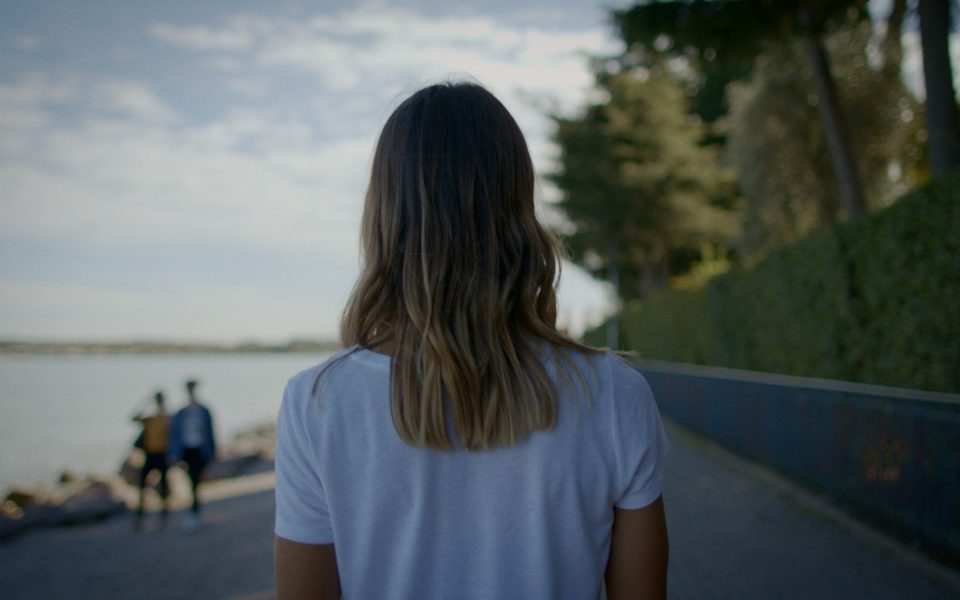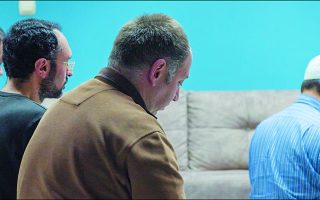‘Gender division is the most fundamental social cleavage’
Athens-based director Nina-Maria Paschalidou discusses her documentary on femicide, ahead of its screening at the Thessaloniki festival

Laura Roveri will never forget the night she went out to celebrate a friend’s birthday at a Verona discotheque eight years ago. The 25-year-old ended up half dead in hospital with 15 stab wounds – inflicted by her boyfriend.
Roveri, now a women’s rights activist and yoga instructor, is the main character in “Femicidio,” the latest documentary by Athens-based filmmaker Nina-Maria Paschalidou, which will be screened at the upcoming 24th Thessaloniki Documentary Festival in northern Greece. Made over the course of four years, the 70-minute coproduction by Al Jazeera and Sky Italia seeks to explore the notion of femicide, generally defined as the murder of a woman because of her gender.
According to official European Union figures, there are approximately 3,500 intimate partner violence related deaths in Europe every year. That is more than nine victims a day, seven of whom are women. Meanwhile, about 86% of domestic violence cases are never reported to a law enforcement agency.
“What struck me about femicide in Italy was that this is not India, or the Middle East or Latin America, meaning societies which are regrettably used to such attitudes to some extent. This is the heart of Europe. Women here have fought for equal rights in employment and salaries and so on. And yet, things are not what they seem,” Paschalidou tells Kathimerini English Edition.
The director recounts Raveri’s struggle to overcome the physical and mental trauma of the attack and to rebuild her life while seeking justice against her ex-partner. Traveling from the northern cities of Vicenza and Verona to the southern shores of Cava de’ Tirreni and the island of Sicily, Paschalidou also interviews experts, lawyers, activists and, most heartbreakingly, family members of femicide victims, exposing the cultural and social dynamics behind domestic violence.
“We live in a patriarchal society that determines people’s roles and status. Gender division is the most fundamental social cleavage: there are men and there are women. Our entire society is built on this premise,” she says, also drawing attention to the Catholic values that run so deep in Italy, which suggest that a woman’s role is in the home, taking care of her children.
According to a recent survey by AstraRicerche, one in four Italians believe that violence against women is not actually a form of violence. Moreover, 30% of men think that physical abuse against women is less serious when the latter have been accused of showing promiscuous or suggestive behavior – 20% percent of women share the same view.
Shooting a documentary on gender equality and female empowerment was not fresh territory for the Veria-born director, who has in the past worked with international networks such as Al Jazeera, ARTE, RAI and PBS’ World Channel. Her 2013 documentary “Kismet” explores the social impact of Turkish soap operas on women across the Arab world and beyond, while “The Snake Charmer,” released four years later, follows the campaign of a famous Bollywood star to stop violence against women in India.
Paschalidou also takes mainstream media to task for perpetuating traditional gender roles and sexist stereotypes. Scantily clad women parading on stage as the camera zooms in on their busts and other physical features has been a casual – and regular – spectacle on former Italian prime minister Silvio Berlusconi’s private Mediaset channels and even national broadcaster RAI.
“The model for a period has been either you are a ‘valletta’ (the female television assistants on game shows) or a mother,” Emma Bonino, a veteran Italian politician and civil rights activist, says on the film.
The issue of physical and psychological violence against women has also gained prominence in Greece recently, in the wake of several brutal femicides. Paschalidou says she believes her country “simply followed the trend,” as Covid lockdowns spurred a spike in domestic abuse.
A Eurobarometer poll commissioned by European Parliament ahead of Women’s Day on March 8, found that 77% of women in the EU believe the pandemic caused a rise in gender violence in their countries. In Greece, nine in 10 women agreed.
While acknowledging the long-term merits of education in driving cultural change and improving the status of women, Paschalidou says prevention is a key, immediate step in stemming abuse. “When a woman petitions for a restraining order the fifth time she’s been abused, or when a woman is admitted to hospital with broken ribs for the eighth time, you must intervene,” she says.
But at the end of the day, she adds, much of the responsibility lies with women themselves. “Looking at Italian society, I realized that women themselves espoused the sexism code. The mother of Laura’s boyfriend would scream out of the window, calling her a ‘hoor.’ It’s the kind of attitude you see in old Italian and Greek movies,” she says.
“The change needs to come from us women changing the way we bring up our sons. I often catch myself telling my boy things that underscore gender distinctions, like: ‘don’t do that, it’s for girls.’ This is something we need to work on. This is why I dedicated this film to my son. I, too, am responsible.”
The 24th Thessaloniki Documentary Festival runs March 10-20. “Femicidio” will screen at the Olympion cinema on Saturday, March 12, at 8 p.m.





